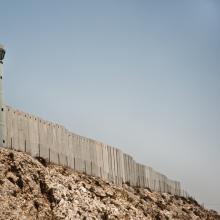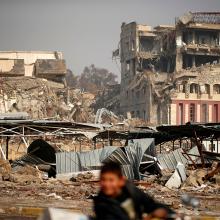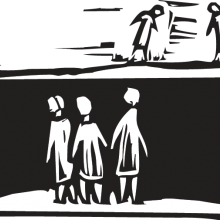conflict
Violence in the Gaza Strip has been raging for more than two months, with more than 115 casualties in the "Great March of Return" protests organized by Hamas, a militant group that controls Gaza. Since the end of March, Palestinians have been protesting to shed light on on the Israeli-Egyptian blockade on Gaza, and also call for the “right of return” for Palestinian refugees displaced since the 1948 war.
Further complicating matters, the Supreme Court has changed its position over time. Its evolving interpretations show how religious freedom debates create shifting categories of winners and losers.
Olcese: In the creation of the film, did you find yourself sympathizing with one character or the other? Was one character easier to make more sympathetic?
Hamm: No. I couldn’t. I absolutely wanted to make the film balanced and fair to both sides. That was completely essential. Don’t forget, both these figures were not liked in Europe before they became statesmen. They were both radical. McGuinness was an ex-member of the IRA, Paisley was a firebrand preacher on the right. These were two men who were pretty much despised universally outside of their own base. It’s like The Odd Couple in the back of a car. I think what the humanity of that is when you take all that away, when you remove from the politician the artifice, and you get a chance to look at them as people, and I think that’s what happens in the movie.
Unfortunately, the script, by writer Colin Bateman often tends toward the bland, with the exception of a couple of pivotal scenes. Both Paisley and McGuinness were big, powerful personalities, with many facets to explore. The script, however, takes what could be a truly interesting exploration of two dynamic characters, and often reduces them to a pair of old men arguing in the back of a car. There are some standout moments where beliefs are challenged and moments of real emotional honesty are reached, but it takes some waiting to get there.
In the same-sex marriage discussion, people cite 2,000 years of church history to support their suspicions of affirming theology. But this same history offers plenty of examples of healthy theological shifts that actually counter tradition. Healing on the Sabbath went against thousands of years of history. Replacing circumcision with baptism went against thousands of years of history. Even the Reformation went against 1,500 years of history, with the Reformers’ claim that they better understood the church fathers than the church did. History reveals that the church is always learning, always engaging in a re-examination of core values.
In other comments published Monday, Chaldean Patriarch Louis Raphael I Sako of Baghdad also said Trump’s policy of preferential immigration for Christians was a “trap” and would “create and feed” tensions with Muslims.
Religion is increasingly viewed as highly politicized, not least due to the way that it is frequently covered in the news. Numerous studies have shown that news stories with emotional cues tend to both gain audience attention and prolong audience engagement.
It may therefore come as no surprise that online debates about religion are packed with emotional cues that evoke strong reactions from those who participate in them. This sets the stage for passionate online debates.

Image via LifeWay Research/RNS
Sometimes a call from God is not enough to keep a pastor in his post.
Many evangelical pastors who quit before retirement age found “another calling” either off the pulpit or out of ministry altogether. But many also say they were driven away by conflict and burnout. So says a new survey of former pastors from four denominations.
CANADIAN MINING companies have left a trail of destruction around the world—mostly in places where people are poor and vulnerable.
The earliest conflicts caused by Canadian mining exploded in Guatemala in the early 1960s when the nickel company Inco dug into the northern mountainside of Guatemala’s largest freshwater lake, Lago Izabal. Almost 155 square miles of traditional Kekchi-Maya land was expropriated to create Inco’s Exmibal mine. As the region descended into bitter war, Guatemalan oligarchs and their military, with the support of Canadian-mining and U.S. geopolitical interests, exterminated all popular dissent. Dozens of Kekchi leaders were killed or disappeared; four prominent leaders who had published a report condemning the Inco-Exmibal deals were brutally assaulted and two of them assassinated. The Exmibal mine operated for three years before Inco abandoned it, never paying a nickel in royalties to Guatemala

Photo via Steve Allen / Shutterstock
DOÑA DIODORA STANDS on the side of the mountain, shivering. She’s tending to her skinny cows. A simple adobe hut stands here on the edge of her land in the Guatemalan highlands—“so I can stay and look after the animals,” she says. “But I don’t know what I am going to do about water. They’ve taken away the water.”
Tears drip down out of her good eye. She dries them on a thin sleeve. The other eye socket, shattered where the bullet went through, seeps with yellow pus. “Me siento un poco triste—a little sad,” she explains in her halting, quiet Spanish. It is cold on the mountain, achingly so. And, mysteriously, the water has gone: Old streams and wells are dusty. The cows look ill.
Just down the crumbling mountain, the tailings pond from the Marlin mine glows a weird shade of neon green.
I first heard about the Marlin mine—operated by Vancouver’s Goldcorp—in 2005, before it opened. That year I was going to Guatemala with a youth group from my diocese, and we were warned: Don’t wear anything that identifies you as Canadians. What? Canadians? We’re supposed to be the good guys in the story. Well, not anymore.
News articles about turmoil at General Theological Seminary had immediate impact on those of us who attended Episcopal seminaries.
But the news “went viral” far beyond that small coterie and for reasons beyond nostalgia.
For one thing, it’s a juicy soap opera. Faculty playing hardball, then finding themselves unemployed. A dean pushing back, then losing credibility as word about him spread. A board looking confused and high-handed. Students wondering if they, too, should go on strike.
But impact goes beyond the particular event itself. For something fundamental seems to be changing.

Ryan Rodrick Beiler / Shutterstock
My people have committed two sins: They have abandoned me, the spring of living waters, and have dug for themselves cisterns, broken cisterns ... that hold no water.
—Jeremiah 2:13
IN THE LATE 1980s and early '90s, Palestinians rose up against the Israeli occupation of Palestinian territories in what became known as the First Intifada. Instead of acceding to the demands for justice by the "children of the stones," the response was a process of talks that led to the signing of the Oslo Accords in 1993.
The “peace process” engaged the leadership of the PLO (Palestine Liberation Organization)—then weak, corrupt, exiled, and with little vision or support—in what turned out to be a worse-than-fruitless effort that led to the perpetuation of the occupation and suffering of the Palestinian people, and which made a just peace even further away.
The process was intriguing to many of us in the peace and justice community, and it successfully co-opted us, as it co-opted the Palestinian leadership, but this process entailed both the abandoning of principled positions and the adoption of the Oslo system, a broken system that could not possibly deliver what it promised.
We were treated to a new language by Israel and the U.S., which seemed at first blush to adopt our own slogans: Where Palestinians were constantly complaining of Israel’s refusal to acknowledge them—its demonization of their leadership, and trying to have Jordan or other local collaborators speak on their behalf—the new process brazenly invited the PLO itself and its leader Yasser Arafat to participate as the “sole legitimate representative of the Palestinian people.”
THE PROBLEM WITH Christianity today is not that Christians lack faith in God. The problem is that Christians believe they “know” and “understand” God completely. In a world overflowing with information, we hardly acknowledge the importance of God’s unknowability. Yet a conception of God that doesn’t recognize the unknowable keeps us in an uncritical banality, which in turn leads us to follow orders without questioning, to play it safe, and to go along with mass opinion.
For Christians, conversion is required. Theologian Bernard J. F. Lonergan defines conversion not simply as an acceptance of a new belief system, but rather as “a radical shift from an old horizon to a new horizon.” Religious conversion, in particular, is to “fall in love with God.” Thus, to convert is to deny the conventional, habitual belief and knowledge system, and to discover a new reality in which one becomes open and vulnerable to challenges. Conversion is not a solitary experience. It is a prolonged dialogue that constantly transforms one’s horizon and motivates us to wonder, appreciate, and raise more questions.
The texts for the next four weeks invite us to a conversion experience. They are reminders that conversion starts with abandoning any sense of security based on doctrines, dogmas, rituals, and systems of belief—precisely because God’s love never allows us to find comfort in human constructions.
In recent years, my family has navigated some rough patches: death, cancer treatments, open heart surgeries, chronic disease, etc. Now, I’m certain this isn’t everyone’s experience, but mine has been that in these times of trauma or tragedy, family comes together to stand with one another as we wrestle through life’s crap. We aren’t picking fights, we are crying on each other’s shoulders.
In recent months, our human family has been enduring an especially rough patch.
War.
Racism.
Suicide.
Deadly viruses.
Plane crashes.
Whether in remote villages or urban centers, few have been untouched (in some way) by the realities unfolding.
As I observe our corporate response to tragedy as a human family, and evaluate my own response in the midst of it, I have noticed something disturbing unfold. Rather than rally together as a family navigating a season of trauma, we have used this moment to divide, stir hatred and misunderstanding, point fingers, and more than anything, view those on the opposite side of an issue as less than human.
"Living the Word" reflections for October 2014 can be found here.
ACROSS DENOMINATIONS, Christians have attempted to build a more egalitarian and democratic ecclesiastical structure. The phrase “discipleship of equals,” coined by the feminist theologian Elisabeth S. Fiorenza, suggests that a community of Jesus’ followers cannot tolerate an absolute, centralizing power that justifies a relationship of dominance and subordination.
Yet, while Christians continue to challenge hierarchical structures in the church, we also acknowledge that a discipleship of equals will not be established simply by removing the hierarchy. The church is enmeshed in a concrete reality of everyday life, filled with a web of power relations that are neither fixed nor necessarily top-down.
Power relations experienced within the church are often inconspicuous. They take the form of microaggressions, subtle insults against other members because of gender, sexual orientation, race, class, and ability status. What is even more hurtful is that these insults are often disguised as “caring,” as when someone perverts a prayer request into gossip. The experience of the powers in the church can be paradoxical. Christians must deal with complicated and variegated claims to power, all of which borrow the name of God.
The texts for the next four weeks highlight the struggles in forming a community of God. They raise the question of power relations within the faithful community: How do we use the word “power” and what should be our first instinct in situations of conflict?
In the Judeo-Christian tradition, God calls us to love and show compassion to the stranger, particularly those who suffer. But first, they must become real to us. And there is nothing more viscerally real, perhaps, than the face of a dead child.
Is it possible to let our hearts by broken by the dead children of our enemy? Is our God big enough to allow us to imagine that God loves those we fear and despise?
Not until, I believe, they have faces.
Iraq, Syria, Ukraine, Israel, Gaza – though religious fervor is alive and well in these embattled areas, loathing, horror, and hatred seem to reign, darkness to rule. In the grim night, we cannot see each other’s faces.
Religious leaders from across Africa and England came together Wednesday to discuss the role clergy should play in preventing and responding to sexual violence.
The panel was part of the three-day Global Summit to End Sexual Violence in Conflict co-chaired by Angelina Jolie, the special envoy for the U.N. high commissioner for refugees. Jolie made an unannounced appearance before the event, causing attendance to surge and preventing several dozen participants from entering the crowded conference room.
In a pre-recorded video message, Archbishop of Canterbury Justin Welby started the session by describing some of the positive developments he observed firsthand on a recent trip to the Democratic Republic of Congo.
“Historically there has been a culture of impunity,” he said. “Faith leaders are challenging that culture fiercely and saying that rape and sexual violence in war is absolutely unacceptable and will result in consequences.”
Spiritual accountability and discipline are slowly becoming extinct within church communities Here are some reasons why:
1. A Desire for Comfort and a Fear of Conflict:
Confrontation is awkward, messy, and just plain hard — so few do it. Additionally, churches and spiritual communities are intentional about creating a sense of peace, encouragement, happiness, and joy — even if it’s a façade.
Identifying sin, exposing immorality, admitting the truth, uncovering corruption, and acknowledging failure contradict the image many churches are trying to portray.
In reality, Christianity was never meant to be comfortable or easy, but in a society obsessed with self-gratification, pleasure, and comfort, churches too easily succumb to an attitude of placation and appeasement instead of responsibility and intervention.
The writers of Parenthood, the popular NBC family drama, use an interesting device to dramatize conflict. When two characters have a difference of opinion their exchange begins in measured, even tones. One person talks, while the other listens. Then the second person talks, while the first one listens. But as their disagreement heats up, the exchange gets faster and faster until no one is listening and both characters are talking over each other so loud and fast that it’s difficult to understand exactly what they are saying. This clip is typical. It’s an argument between Sarah and her boyfriend, Mark, over whether or not she will be able to keep her promise to attend a weekend getaway with him.















